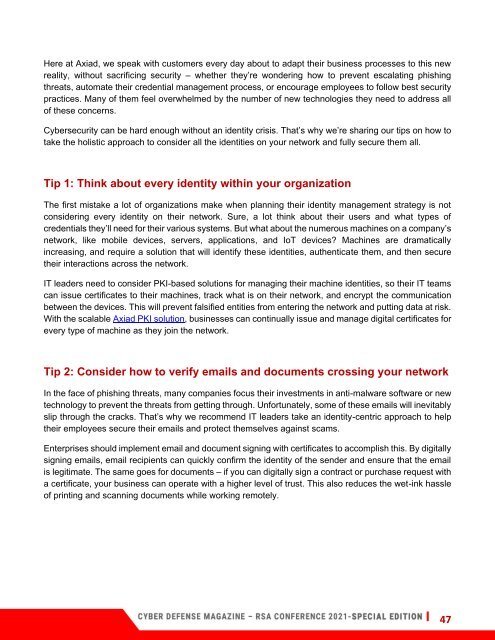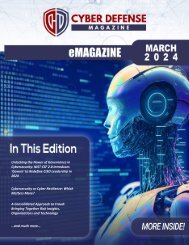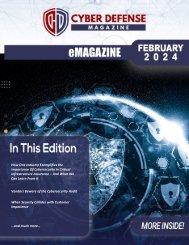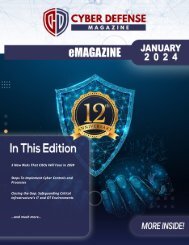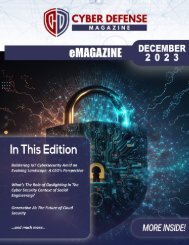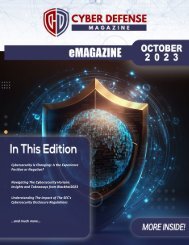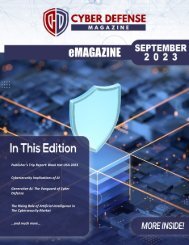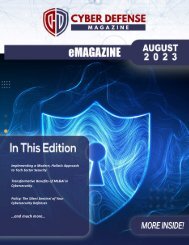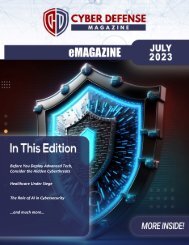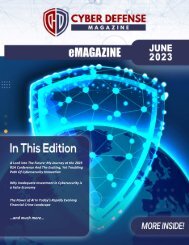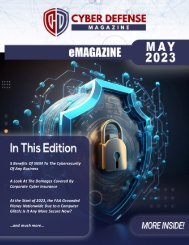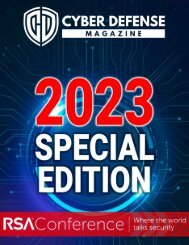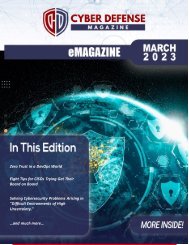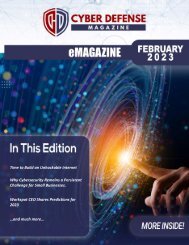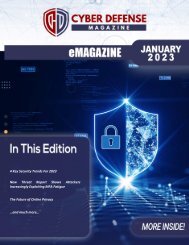Cyber Defense Magazine Special Annual Edition for RSA Conference 2021
Cyber Defense Magazine Special Annual Edition for RSA Conference 2021 - the INFOSEC community's largest, most popular cybersecurity event in the world. Hosted every year in beautiful and sunny San Francisco, California, USA. This year, post COVID-19, virtually with #RESILIENCE! In addition, we're in our 9th year of the prestigious Global InfoSec Awards. This is a must read source for all things infosec.
Cyber Defense Magazine Special Annual Edition for RSA Conference 2021 - the INFOSEC community's largest, most popular cybersecurity event in the world. Hosted every year in beautiful and sunny San Francisco, California, USA. This year, post COVID-19, virtually with #RESILIENCE! In addition, we're in our 9th year of the prestigious Global InfoSec Awards. This is a must read source for all things infosec.
You also want an ePaper? Increase the reach of your titles
YUMPU automatically turns print PDFs into web optimized ePapers that Google loves.
Here at Axiad, we speak with customers every day about to adapt their business processes to this new<br />
reality, without sacrificing security – whether they’re wondering how to prevent escalating phishing<br />
threats, automate their credential management process, or encourage employees to follow best security<br />
practices. Many of them feel overwhelmed by the number of new technologies they need to address all<br />
of these concerns.<br />
<strong>Cyber</strong>security can be hard enough without an identity crisis. That’s why we’re sharing our tips on how to<br />
take the holistic approach to consider all the identities on your network and fully secure them all.<br />
Tip 1: Think about every identity within your organization<br />
The first mistake a lot of organizations make when planning their identity management strategy is not<br />
considering every identity on their network. Sure, a lot think about their users and what types of<br />
credentials they’ll need <strong>for</strong> their various systems. But what about the numerous machines on a company’s<br />
network, like mobile devices, servers, applications, and IoT devices? Machines are dramatically<br />
increasing, and require a solution that will identify these identities, authenticate them, and then secure<br />
their interactions across the network.<br />
IT leaders need to consider PKI-based solutions <strong>for</strong> managing their machine identities, so their IT teams<br />
can issue certificates to their machines, track what is on their network, and encrypt the communication<br />
between the devices. This will prevent falsified entities from entering the network and putting data at risk.<br />
With the scalable Axiad PKI solution, businesses can continually issue and manage digital certificates <strong>for</strong><br />
every type of machine as they join the network.<br />
Tip 2: Consider how to verify emails and documents crossing your network<br />
In the face of phishing threats, many companies focus their investments in anti-malware software or new<br />
technology to prevent the threats from getting through. Un<strong>for</strong>tunately, some of these emails will inevitably<br />
slip through the cracks. That’s why we recommend IT leaders take an identity-centric approach to help<br />
their employees secure their emails and protect themselves against scams.<br />
Enterprises should implement email and document signing with certificates to accomplish this. By digitally<br />
signing emails, email recipients can quickly confirm the identity of the sender and ensure that the email<br />
is legitimate. The same goes <strong>for</strong> documents – if you can digitally sign a contract or purchase request with<br />
a certificate, your business can operate with a higher level of trust. This also reduces the wet-ink hassle<br />
of printing and scanning documents while working remotely.<br />
47


